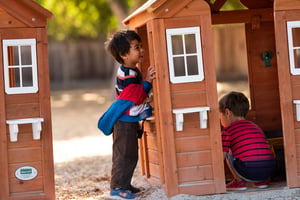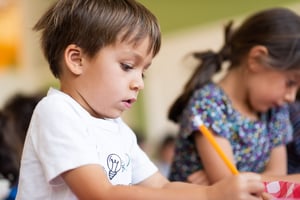Developmental Milestones in the Early Years
One of the most common concerns of parents of preschool-aged children is whether their child is on track developmentally. Parents naturally want to know how their child is doing at school, and wonder how their child compares to their peers in terms of their social and academic development.
Each child develops at his/her own pace, and there is a wide range of normal for a child’s developmental timeline. However, there are some general milestones we can point to that a child will reach as they mature, in terms of play/socialization and language/reading.
Play & Socialization
-
 Parallel Play (up to age 2/3) Initially children engage in what is called “Parallel Play.” Children may physically be playing side by side and doing the same thing, but socially they will be playing independently. For example, if two children are playing with blocks, they will each be constructing their own tower, not building a single tower together.
Parallel Play (up to age 2/3) Initially children engage in what is called “Parallel Play.” Children may physically be playing side by side and doing the same thing, but socially they will be playing independently. For example, if two children are playing with blocks, they will each be constructing their own tower, not building a single tower together.
- Social Play (around age 3) Around preschool age, children shift to a more interactive style of play. Because children all develop at different rates, in preschool children may be at mismatched developmental stages. Children can sometimes become frustrated if one wants to engage socially while the other is not yet ready for that type of play. However, the more kids are encouraged to play together, the better they will become at cooperation and interaction.
 Imaginative Play, Creativity & Wonder (ages 3-4) Between ages 3 and 4, children become capable of co-creating imaginative worlds that they play in together (such as playing house, playing superheroes, etc.). Children will begin to make up their own stories and songs. They will start to wonder how things work, and will begin to develop problem-solving skills.
Imaginative Play, Creativity & Wonder (ages 3-4) Between ages 3 and 4, children become capable of co-creating imaginative worlds that they play in together (such as playing house, playing superheroes, etc.). Children will begin to make up their own stories and songs. They will start to wonder how things work, and will begin to develop problem-solving skills.
- Rules-Based Play (ages 4-5) Around PreK, children are better able to understand directions and follow rules, and they are able to understand and enjoy simple board games and card games (for example: Candy Land, Go Fish, etc.). At this age, children also develop a better understanding of what is real and what is “make believe.”
- Collaborative Play (ages 5-6) By the time they are in Kindergarten, children have a better understanding of the world around them. They are more capable of showing their emotions and communicating their feelings, leading to play that is more complex, reciprocal, and collaborative.
![]() Some children are naturally better at understanding emotions, while others need more help and explicit instruction, and this is perfectly normal. Throughout their development, children can be taught how to read faces and emotions, and can practice how to respond appropriately so they can get along well with others and make friends.
Some children are naturally better at understanding emotions, while others need more help and explicit instruction, and this is perfectly normal. Throughout their development, children can be taught how to read faces and emotions, and can practice how to respond appropriately so they can get along well with others and make friends.
Language Development & Reading
- Preschool (around age 3) During the preschool years, oral language development is most important and is what we focus on in the classroom (it is especially important for the bilingual child). The more a child develops his/her oral vocabulary, the more success they will have when they begin to read and write. By the age of three, children should begin to speak in longer sentences, and sing songs. They may start to “pretend write” by scribbling on paper.
 PreK/Kindergarten (around age 4-5) Children begin to recognize letters and understand that letters represent sounds. They should be able to write their own name and form the letters of the alphabet.
PreK/Kindergarten (around age 4-5) Children begin to recognize letters and understand that letters represent sounds. They should be able to write their own name and form the letters of the alphabet.
- Kindergarten – 1st grade Language and reading development can be quite variable. Some children may be able to read at age 4, while others may not read comfortably until age 7, and this entire range is normal developmentally. At INTL* we choose not to formally teach reading until 1st grade because this is when a majority of students are able to learn to read with confidence and success, which leads to a life-long love of reading.
These milestones can serve as useful guidelines to gauge if your child is generally on track on a typical timeline of early childhood development. However, what we always emphasize to parents is that each child is unique, and takes his/her own time, reaching each milestone on the perfect timeline for them.
*In 2020, the International School of the Peninsula (ISTP) formally changed its name to Silicon Valley International School (INTL) to better reflect its bilingual programs, location, and international values.




